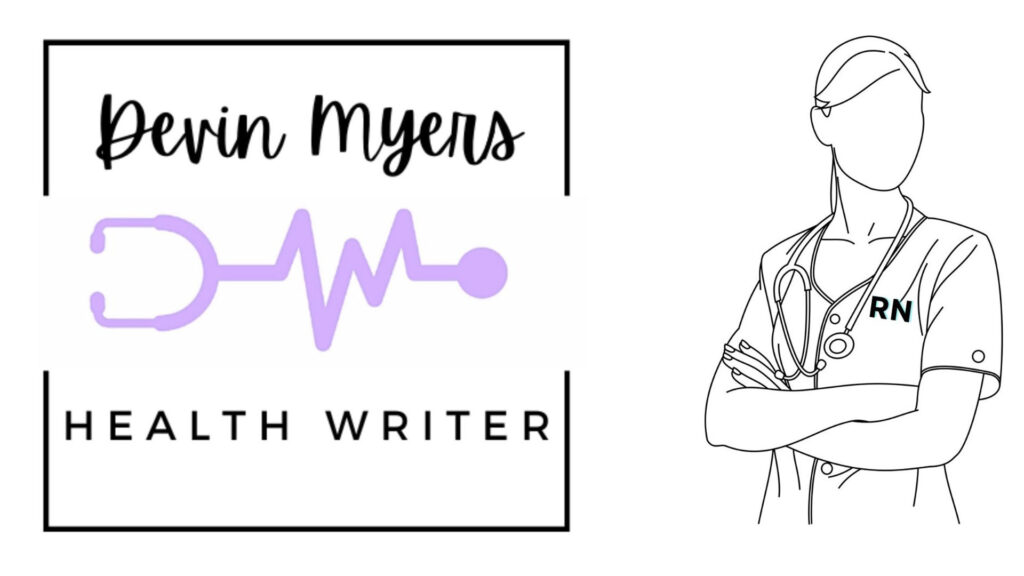
Guest post from Devin Myers, RN
Devin Myers is a health writer as well as a registered nurse. She has experience in various areas of nursing including critical care and hemodialysis. She has worked with many people with type 1 diabetes (T1D) throughout her career and has relatives with T1D.
Her passion is sharing health information on a large scale to help people live healthier lives.
When not writing or working as a nurse, you can find her spending time with her husband and son, hiking, boating, and spending time at the family cottage.
Visit her website to learn more: myershealthwriter.com
What I, a nurse, want patients with type 1 diabetes to know before their next healthcare appointment.
The three things I want you to know are:
- I am listening.
- I care.
- I want to work WITH you to find solutions.
I know many people with type 1 diabetes (T1D). My sister was diagnosed at the age of 5, my brother was diagnosed at the age of 16, and I have other close relatives who have been diagnosed. I am also a registered nurse with eight years of experience and have cared for many people with T1D over the course of my career. I see the daily challenges and how every aspect of life can be impacted. So many people with T1D often feel misunderstood and judged by healthcare providers.
I spoke with my sister, Jane, who has had T1D for 32 years. When I asked about her experiences with healthcare providers, she said that when she was first diagnosed at 5 years old, she remembers that all the healthcare providers were very nice. When she got older, she remembers feeling ashamed when going to appointments.
Some of the more unpleasant interactions stick out in her mind. She said, “A doctor once told me I was her worst diabetic”. She also stated that a healthcare provider asked her when she ate her last chocolate bar. During another visit a healthcare provider said, “I am a diabetic too, so I know how this works” and proceeded to tell her a list of things she had to do. Because these specific things were working for him, he said they “should” work for her too. Jane states, “It’s hard because you’re the one living with it and you try your best”, but often she feels unheard during these appointments.
I have heard similar stories from other people with T1D that I have met with in my practice, as well as my other family members. I think it is safe to assume that you may have had at least one encounter with a healthcare provider that made you feel shame, guilt, or unheard.
So, imagine you are due to have your next appointment with your doctor. You are worried your A1C, the measurement of your blood sugar average over 3 months, will be high. The last few weeks have been stressful. You know you didn’t eat as well as you “could” have, and you have been exercising but “not enough”. You are ashamed that your blood sugar level isn’t where you need it to be, and you don’t want to feel even worse about it when you speak with your healthcare provider.
You arrive for your appointment. You walk into the building, and you see me, your nurse. I greet you, get you situated, and then we begin. Remember the three things I want you to know:
- I am listening.
I genuinely want you to tell me what you are thinking and feeling. I want to know how your life has been since your last visit. What have you been struggling with? What has been going well? What do you need help changing, or maintaining, with your blood sugars, schedule, insulin, and diet? Share as much as you feel comfortable sharing. The more information I have about how things are truly going, the better care I can provide.
Also, remember that we are all human. Healthcare providers can say the wrong thing. It is unfortunate but it is the reality. We all have our biases that we may not even notice. If something I say upsets or offends you, tell me. I want to know so that I don’t do it again. If you have had a negative experience in the past with another healthcare provider, tell me. I don’t need to know the specific details, but knowing your general experiences will help me support you in ways that another healthcare provider was not able to.
- I care.
I want to help people be healthy. I don’t want to speak for all healthcare providers, but it is a safe bet that most healthcare providers want that too. I care about your health, and I genuinely want to spend my time helping you be the healthiest version of you.
- I want to work WITH you.
It is your life. Your daily routines, diet, hobbies, interests, joys, challenges, and supports are all different from mine, and everyone else. What works for my sister, my brother, and my other patients in terms of insulin, exercise, and diet might not work for you. Everyone is so different and so many things affect your blood sugar and how your body uses insulin; diabetes management is not a one size fits all.
My goal is to find solutions that are going to work for you. It is a collaborative effort when coming up with a plan that will help you be as healthy as you can be. If your conversation doesn’t feel collaborative, speak up.
I, unfortunately, will not be with you during your next appointment. You may not get to speak with a nurse before you see your family doctor, an endocrinologist, a dietician, a lab tech, or anyone else on the healthcare team. But please remember that I am listening, and I care. I want to work with you and all other individuals with diabetes, and other healthcare providers do too. Go into your next appointment with this mindset. See if it helps you share a little bit more, or address something that was said that made you feel shame. Collaborate with your healthcare provider to set a realistic goal for your next appointment that you feel might fit with your life. Open communication is the key to good care. You can do it. We are listening.
If you need some more resources, a peer support group, or other educational material, the JDRF has supports in place.
Source:



